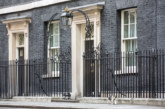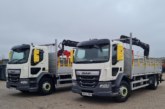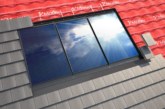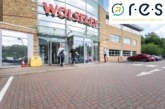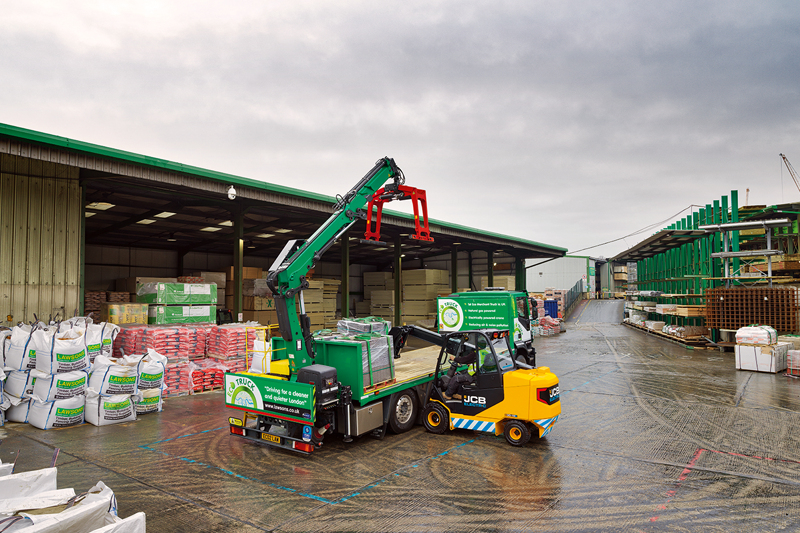
Without compromising on performance, Lawsons has once again looked to an environmentally-friendly solution to its transport and handling requirements as it places an order for five electric-powered JCB Teletruks. PBM reports.
Launched in spring 2019, the JCB 30-19E is the first electric-powered model to be added to the company’s Teletruk range. Following successful trials at a number of its sites in London and the South East, Lawsons has recently placed an order for five of the units — the first UK customer to invest in the new model.
The machines will be deployed at the independent merchant’s facilities at Bedford and Edgware, and their acquisition is part of a move by Lawsons towards greater use of electric-power across its materials handling equipment fleet which has included the delivery of a number electric-powered Combilift trucks (see panel).
11 of Lawsons’ 17 depots are within the boundary of the M25 motorway and so with many of its facilities located in urban environments close to residential communities, the merchant says that it is increasingly conscious of the need to be a ‘good neighbour’ by doing all it can to consider any concerns that those who live near its branches have about noise and air quality.
David Harvey, Group Transport Manager, said: “We make every effort to ensure that the materials handling equipment in use at our sites — particularly those located in higher density environments — is as quiet as possible andcomplies with current emission standard regulations.
“We are constantly assessing ways of making our depots more environmentally responsible and give careful consideration to the mix of materials handling equipment in operation. As soon as we heard that JCB had developed an electric-powered Teletruk that is quiet in operation and produces no harmful emissions, we knew that it would be perfect for us.”
JCB originally launched the (diesel) Teletruk in 1997 and Lawsons was an early adopter, now running some 55 diesel-powered units. As outside space at many of the branches is limited, the Teletruk has proved to be a particularly suitable solution as its telescopic forward reach boom allows trailer and vehicle beds to be accessed from only one side, meaning that vehicles can be tightly parked next to a wall or racking yet still able to be easily loaded or unloaded.
David added: “Because land is at a premium in and around London and the South East we have to maximise the use of every square foot of space we have at all of our sites and the Teletruk’s ability to load and unload from one side of a trailer has allowed us to install extra racking at a number of our depots.”
Moving back to the new electric units, power is provided by an 80-volt lead acid battery which JCB says can work a full eight hour shift on a single charge. The manufacturer adds that, thanks to its AC electric driveline, the new truck can climb a 21% gradient or ramp with ease whilst productivity is further enhanced with full free lift of 1575mm as standard and a lift capacity of 1900kg at 2 metres.
Paul Murray, JCB’s Teletruk General Manager, said: “The introduction of electric-powered Teletruks has been met with an overwhelmingly positive response. Emissions, noise and the need to maximise all available space, are critically important considerations when it comes to choosing materials handling equipment for an urban facility.
“For companies such as Lawsons that are operating in close proximity to residential property and where space is often restricted, the Teletruk offers so many clear advantages and, while IC engine-powered models in the JCB Logistics Teletruk range meet the most stringent emissions regulations, the introduction of a battery-powered range makes the case for Teletruk even more compelling.”
Lawsons’ adds that the phased introduction of electric-powered handling equipment across its business will also help the company in its aim to achieve Freight Operator Recognition Scheme (FORS) Gold accreditation. David said: “It is important that we demonstrate best practice across our business and we are going for FORS Gold accreditation as part of our ongoing process of continuous improvement.”
Lawsons drives to sustainability
A long term user of Combilift’s multidirectional forklifts, Lawsons now operates around 35 of the versatile space-saving machines, the majority of which are 4t C4000 models. In May last year, Lawsons took delivery of a number of electric trucks from the Irish manufacturer — two C4000Es for its Merton branch and numerous STEs at Whetstone and Camden — as the business continued on its path to reduce emissions and keep noise levels to a minimum for its neighbours in residential areas.
In early 2018, the merchant added its first natural gas-powered heavy truck to its London delivery fleet, taking on a 26-tonne Iveco Stralis NP running on compressed natural gas (CNG). The vehicle (which is also featured in the main image with the electric JCB Teletruk) is said to offer significant sustainability advantages over diesel with 50% less NOx emissions, 95% less particulate matter versus Euro VI limits, and 95% less CO2when using compressed biome thane.
To find out more about Lawsons, visit https://www.lawsons.co.uk/
For more information on JCB’s Teletruk range, visit https://www.jcb.com/en-gb/products/industrial-forklifts




